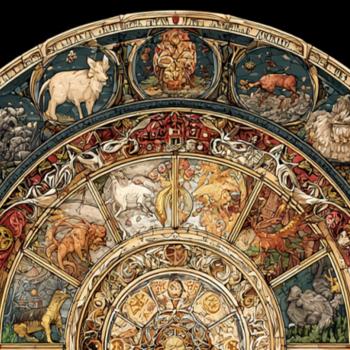
I hope you’re sitting down. Maybe grab a stress ball or cuddle with your therapy dog.
Ready? Ok. Here goes.
The New Testament is filled with epistles that were not written by Paul or Peter. These are called “Pseudepigrapha” because, like other fake scriptures circulated in the late second and third centuries, they were not authored by the Apostle whose name appears on it.
The textbook definition of Pseudepigrapha is:
“Spurious or pseudonymous writings ascribed to various biblical patriarchs and prophets but composed within approximately 200 years of the birth of Jesus Christ.”
In other words, the New Testament you’re holding contains “scriptures” that are about as reliable as The Gospel of Thomas, The Epistle of Barnabus, or The Book of Enoch [which the New Testament book of Jude quotes, by the way].
Sorry to break it to you like this, but there was no other way.
You need to know the truth.
So, which books of the New Testament are Pseudepigrapha and how did they get in there?
Great questions! Let’s take the first one:
Several letters bearing Paul’s name are disputed among scholars, namely:
- Ephesians
- Colossians
- 2 Thessalonians
- 1 Timothy
- 2 Timothy
- Titus
Scholars are sharply divided on whether or not Colossians and 2 Thessalonians are genuine, but when it comes to Ephesians and the so-called “Pastoral Epistles” [that would be 1 and 2 Timothy, and Titus] most critical scholars have no trouble labeling them as pseudepigraphical works.
I know. It’s hard to take. Breathe deep.
Are you ready for more?
No one knows who wrote either 1 Peter or 2 Peter, but the one thing almost every New Testament scholar agrees on is this: It probably wasn’t the Apostle Peter.
Ouch.
But, the good news is that we do have seven undisputed letters from Paul that were accepted and included in nearly every early Christian canon, including the first by Marcion.
Those are:
- Romans
- First Corinthians
- Second Corinthians
- Galatians
- Philippians
- First Thessalonians
- Philemon
Ok, so on to the second question: “How did these fake letters from Peter and Paul end up in our Bibles?”
Well, that’s easy: Because the Christians who decided which books were in or out of the Canon – around 400 AD – didn’t make their decisions using textual criticism. Usually, the decision was made by consensus, or based on opinions.
In fact, in some cases, they just prayed and waited for God to move the scrolls that were not authentic on to the floor. [Nope. I’m not making that up].
Still other decisions about the Canon, like the Council of Trent [1546] were nearly too close to call, with 24 yea, 15 nay and 16 abstaining. So, it could’ve gone another way, I suppose.
Maybe a better question is: “Why do some Bible scholars today doubt these letters of Paul and Peter?”
This could take a long time. So, if you’re really interested in the gory details, I’d recommend Googling “Disputed Letters of Paul” or “Peter” and start heading down the rabbit hole.
For the rest of you, here’s the short answer:
Summary of reasons to doubt Pauline authorship of Ephesians:
- The language and style are different. Ephesians contains 40 new words, e.g. 1:3 “heavenly places”; “family, or fatherhood” (3:15). 1:19 has four different words for “power”
- Ephesians and Colossians use a different word for “reconcile” from Paul’s word (Col 1:20, 22; Eph 2:16).
- Ephesians is similar to Colossians at many places. Eph has 155 verses, 73 of which are similar to ones from Col: e.g. Eph 4:1-2 ≈ Col 3:12-13, Eph 5:19-20 ≈ Col 3:16-17, Eph 6:21-22 ≈ Col 4:7-8.
- Ephesians takes many key ideas from Colossians. Wisdom, mystery. The word of truth. Gospel of salvation. Saints of God.
- Ephesians also refers to most of the other letters of Paul. In many ways it seems like a summary of Paul’s ideas, written by a disciple of his, and brought up to date for the Church of his own time.
- Metaphors, or illustrations in Paul are turned into actual objective realities in Ephesians (and sometimes in Colossians also). E.g. faith, gospel, word of God, reconciliation, salvation, human resurrection and glorification, the Church as the Body of Christ, Minister, Saints of God.
- Ephesians shows that the Church is becoming an advanced and powerful universal institution (rather like the Church today). In Paul’s time there was no universal Church in that sense, but only informal gatherings of individual believing communities.
- Ephesians contains no mention of charismatic gifts.
- Ephesians shows Jesus acting on his own account and by his own authority without making explicit that he is acting on God’s behalf and with God’s blessing; in Paul’s other letters, this is more explicit.
Summary of reasons to doubt Pauline authorship of Colossians:
- The basis for the early objection was that the letter aimed at refuting Gnosticism, a heresy which had not reached its ascendancy until the early 2nd century.
- Another argument centers on differences in style and vocabulary with significant stylistic differences between Colossians and Paul’s other works, such as unusual genitive constructions.
- The extensive theological development in the epistle compared to other epistles has also led to skepticism concerning Pauline authorship.
Summary of reasons to doubt Pauline authorship of 2 Thessalonians:
- Much of the dispute concerns the linguistic similarity between 1 Thessalonians and 2 Thessalonians. For example, 1 Thess 2:9 is almost identical to 2 Thess 3:8.
- Reflects knowledge of the synoptic gospels, which, according to the current scholarly consensus, had not been written when Paul wrote his epistles.
- Actually makes the specific claim not to be a forgery, which is a typical claim of forgers at the time.
- The eschatology of each letter to the Thessalonians is considerably different.
Summary of reasons to doubt the Pastoral Epistles of Paul:
- Marcion’s canon [the earliest of all] does not include them and there is no evidence he had ever heard of them
- The vocabulary and phraseology used in the Pastorals is often at variance with that of the other epistles.
- Over 1/3 of the vocabulary is not used anywhere else in the Pauline epistles, and over 1/5 is not used anywhere else in the New Testament, while 2/3 of the non-Pauline vocabulary are used by 2nd-century Christian writers.
Summary of reasons to doubt that Peter wrote 1 Peter:
- The language, dating, style, and structure of the letter has led many scholars to doubt its authenticity.
- The writer appears to have had a formal education in rhetoric and philosophy, and an advanced knowledge of the Greek language, none of which would be usual for a Galilean fisherman.
- The letter lacks all reference to any personal details regarding the historical Jesus of Nazareth.
- The author references the Septuagint translation which would’ve been an unlikely source for historical Peter to reference.
Summary of reasons to doubt that Peter wrote 2 Peter:
- The second epistle of Peter identifies the author as Peter but uses a different spelling than 1 Peter and the rest of the New Testament.
- There are significant linguistic differences from 1 Peter
- The author references the book of Jude
- The epistles makes allusions to 2nd-century gnosticism
- The letter encourages the church in the wake of a delayed Second Coming of Christ.
- The letter has the weakest amount of scholarly and external support than any other New Testament epistle.
BOTTOM LINE: Your Bible is chock-full of pseudepigrapha.
However, this doesn’t mean that these books should be removed from the Canon. Nor does it suggest that they are not inspired by the Holy Spirit.
Personally, I don’t know who wrote Ephesians or Colossians, but I can affirm that whoever did so was quite inspired by the Holy Spirit and very much enlightened as to the nature and character of Christ.
I’m less convinced of any inspiration when it comes to the Pastoral Epistles, however, and I’m not sure yet where I stand on 1 or 2 Peter.
The question of inspiration and authority is, in itself, a serious problem for most Christians. We tend to place more authority on the Bible rather than on Christ, even though Christ [in the Bible] tells us that “all authority in heaven and on earth has been given to me [Christ].” (See Matt. 28:18)
What we have to do is to learn how to abide in Christ and to know the voice of the Good Shepherd so clearly that we know inspired truth when we hear it, regardless of where it comes from.
Even the most famous verse in the Pseudepigraphal book of 2 Timothy says that “all the God-breathed writings [graphis] are profitable for teaching, instruction, rebuke and training in righteousness.” [2 Tim. 3:16]
The trick is to learn which writings are God-breathed and which are not.
How do we do that? Well…
“Their minds were made dull, for to this day the same veil remains when the old covenant is read. It has not been removed, because only in Christ is it taken away.” [2 Cor. 3:14]
“But we have the mind of Christ.” [1 Cor. 2:16]
“My sheep hear my voice, and they follow me and I know them.” [John 10: 27-28]
Let’s learn to lean on Christ and not on what others have said about Christ.
“You search the Scriptures because you think that in them you will find life. Yet you refuse to come to me to find life.” [John 5:39-40]
The more we abide in Christ and the more Christ abides in us, the easier it will be to discern the voice of God.
Our authority is Christ, and Christ alone.
Do you agree?
**
Keith Giles was formerly a licensed and ordained minister who walked away from organized church 11 years ago, to start a home fellowship that gave away 100% of the offering to the poor in the community. Today, He and his wife live in Meridian, Idaho, awaiting their next adventure.
His new book “Jesus Unbound: Liberating the Word of God from the Bible”, is available now on Amazon and features a Foreword by author Brian Zahnd.
He is also the author of the Amazon best-seller, “Jesus Untangled: Crucifying Our Politics To Pledge Allegiance To The Lamb” with a Foreword by Greg Boyd.
Keith also co-hosts the Heretic Happy Hour Podcast on iTunes and Podbean.
BONUS: Want to unlock exclusive content including blog articles, short stories, music, podcasts, videos and more? Visit my Patreon page.













